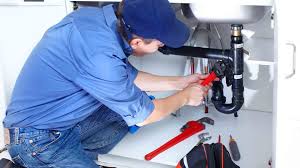Plumber Courses in Sri Lanka

Plumber Courses in Sri Lanka
The demand for skilled tradespeople, including plumbers, has been steadily increasing in Sri Lanka. As the construction industry grows and more homes and commercial properties are developed, the need for qualified plumbers is more significant than ever. If you're considering a career in plumbing or want to upgrade your skills, this guide will provide you with all the information you need about plumber courses in Sri Lanka.
1. Why Choose a Career in Plumbing?
- High Demand: With the ongoing development in infrastructure and housing, skilled plumbers are always in demand.
- Job Security: Plumbing is a trade that cannot be outsourced, ensuring long-term job security.
- Good Income Potential: Experienced plumbers can earn a good income, especially those who take on specialized or complex projects.
- Opportunities for Growth: Plumbing offers various opportunities for career advancement, including starting your own business.
2. Overview of Plumber Courses in Sri Lanka
Plumbing courses in Sri Lanka are designed to equip students with the practical skills and theoretical knowledge needed to succeed in the field. These courses typically cover areas such as:
- Basic Plumbing Skills: Introduction to tools, materials, and basic techniques.
- Advanced Plumbing Techniques: Training in complex plumbing systems, including gas fitting, drainage, and hot water systems.
- Health and Safety: Understanding safety standards and regulations in the plumbing industry.
- Blueprint Reading: Learning to interpret construction plans and diagrams.
- Business Management: For those interested in starting their own plumbing business, some courses offer modules on business management and customer relations.
3. Top Institutes Offering Plumber Courses in Sri Lanka
Several institutions across Sri Lanka offer accredited plumbing courses. Here are some of the most recognized:
- Vocational Training Authority (VTA) of Sri Lanka: VTA offers a comprehensive plumbing course that covers both theoretical and practical aspects. It is one of the most well-regarded institutions for vocational training in the country.
- National Apprentice and Industrial Training Authority (NAITA): NAITA provides apprenticeship programs where students can learn plumbing on the job, supplemented by classroom training.
- Construction Industry Training Institute (CITI): CITI offers specialized courses in plumbing, focusing on both residential and commercial systems.
- Colombo School of Construction Technology (CSCT): Known for its industry-relevant courses, CSCT offers plumbing courses as part of its broader construction training programs.
4. Course Structure and Duration
Plumbing courses in Sri Lanka vary in duration depending on the level of expertise and the type of course:
- Basic Certificate Courses: Typically last 3 to 6 months, covering fundamental plumbing skills.
- Diploma Courses: Can take up to 1 year to complete and include more in-depth training in advanced plumbing techniques.
- Apprenticeship Programs: Usually last 2 to 3 years, combining on-the-job training with classroom instruction.
5. Cost of Plumber Courses
The cost of plumber courses in Sri Lanka can vary widely depending on the institution, course duration, and level of certification:
- Basic Certificate Courses: LKR 20,000 - 40,000.
- Diploma Courses: LKR 50,000 - 100,000.
- Apprenticeship Programs: Costs are often subsidized, with some programs offering stipends to apprentices.
6. Qualifications and Eligibility
Most plumbing courses require students to have completed their Ordinary Level (O/L) examinations. Some advanced courses or apprenticeship programs may require prior experience or additional qualifications, such as a National Vocational Qualification (NVQ).
7. Career Opportunities After Completing a Plumbing Course
After completing a plumbing course in Sri Lanka, graduates can pursue various career paths, including:
- Residential Plumber: Specializing in installing and repairing plumbing systems in homes.
- Commercial Plumber: Working on larger projects, such as office buildings, schools, and hospitals.
- Maintenance Plumber: Providing ongoing maintenance and emergency repairs for existing plumbing systems.
- Entrepreneur: Starting your own plumbing business, offering services to both residential and commercial clients.
- Specialized Roles: Focusing on areas like gas fitting, pipe fitting, or installing high-tech plumbing systems.
8. Certification and Licensing
Upon completion of a plumbing course, students typically receive a certificate from the institution. To work as a professional plumber, especially in specialized areas, obtaining a license may be required. The National Vocational Qualification (NVQ) framework in Sri Lanka offers various levels of certification that can enhance your credentials and employability.
9. Future Prospects in the Plumbing Industry
The plumbing industry in Sri Lanka is expected to continue growing, driven by ongoing construction projects and the need for skilled labor. With additional training and experience, plumbers can move into supervisory roles, specialize in high-demand areas, or even expand into related trades like HVAC (heating, ventilation, and air conditioning).
10. Conclusion
A career in plumbing is both rewarding and stable, with numerous opportunities for growth and advancement. By enrolling in a reputable plumbing course in Sri Lanka, you can gain the skills and knowledge needed to succeed in this essential trade. Whether you're just starting out or looking to upgrade your skills, there's a course tailored to meet your needs and help you achieve your career goals.

